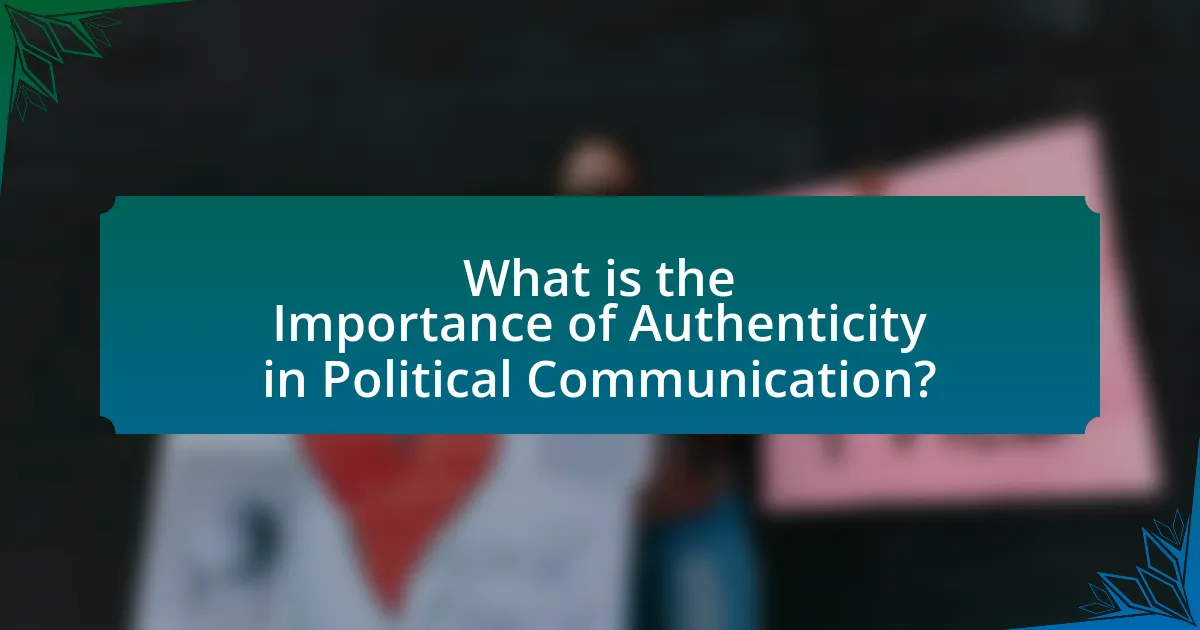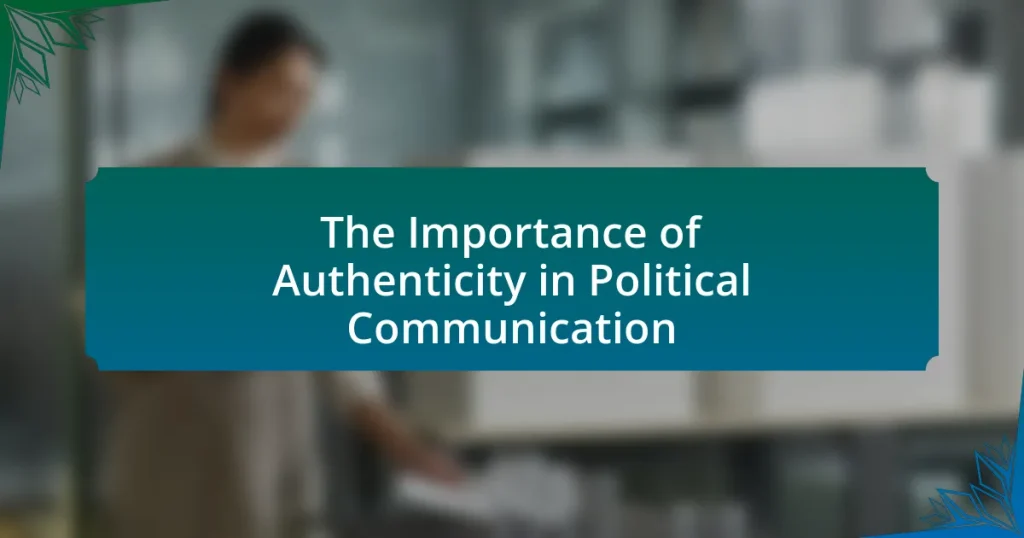Authenticity in political communication is essential for fostering trust between politicians and the public, enhancing voter engagement and support. Key elements defining authenticity include transparency, consistency, and relatability, which significantly influence public perception and voter behavior. Research indicates that voters prioritize candidates who demonstrate genuine beliefs and values, as authenticity directly impacts voter turnout and civic participation. Conversely, inauthentic communication can lead to decreased trust, increased skepticism, and political polarization, undermining the effectiveness of political campaigns and institutions. Strategies for cultivating authenticity include active listening, storytelling, and maintaining consistent messaging, which are crucial for building meaningful connections with constituents.

What is the Importance of Authenticity in Political Communication?
Authenticity in political communication is crucial because it fosters trust between politicians and the public. When political figures communicate authentically, they are perceived as more credible and relatable, which can enhance voter engagement and support. Research indicates that voters are more likely to support candidates who demonstrate genuine beliefs and values, as evidenced by a study published in the Journal of Political Marketing, which found that authenticity significantly influences voter perceptions and decision-making. This connection between authenticity and trust underscores its importance in effective political communication.
Why is authenticity crucial in political discourse?
Authenticity is crucial in political discourse because it fosters trust between politicians and the public. When political leaders communicate authentically, they are perceived as genuine and relatable, which enhances their credibility. Research indicates that voters are more likely to support candidates who demonstrate authenticity, as evidenced by a study published in the Journal of Political Marketing, which found that authenticity significantly influences voter preferences and engagement. This trust is essential for effective governance and civic participation, as it encourages open dialogue and collaboration between constituents and their representatives.
What are the key elements that define authenticity in political communication?
The key elements that define authenticity in political communication include transparency, consistency, and relatability. Transparency involves openly sharing information and intentions, which fosters trust between politicians and the public. Consistency refers to the alignment of a politician’s words and actions over time, reinforcing credibility. Relatability allows politicians to connect with constituents on a personal level, making their messages more impactful. Research indicates that voters are more likely to support candidates perceived as authentic, as evidenced by a study published in the Journal of Political Marketing, which found that authenticity significantly influences voter trust and engagement.
How does authenticity influence public perception of political figures?
Authenticity significantly influences public perception of political figures by enhancing trust and relatability. When political leaders are perceived as genuine, they foster a stronger emotional connection with constituents, which can lead to increased support and loyalty. Research indicates that voters are more likely to favor candidates who demonstrate authenticity through consistent messaging and transparent behavior, as seen in the 2008 U.S. presidential election where Barack Obama’s authentic communication style resonated with many voters, contributing to his electoral success. This correlation between authenticity and public perception underscores the critical role that genuine representation plays in political communication.
How does authenticity impact voter engagement?
Authenticity significantly enhances voter engagement by fostering trust and relatability between candidates and constituents. When voters perceive candidates as genuine, they are more likely to feel connected to their messages and motivated to participate in the electoral process. Research conducted by the Pew Research Center indicates that 70% of voters prioritize a candidate’s honesty and integrity when making their voting decisions, demonstrating that authenticity directly influences voter turnout and involvement. Furthermore, candidates who communicate authentically are often more successful in mobilizing grassroots support, as their sincerity resonates with voters’ values and concerns.
What role does authenticity play in building trust with constituents?
Authenticity plays a crucial role in building trust with constituents by fostering transparency and relatability. When political leaders communicate authentically, they demonstrate honesty and integrity, which are essential for establishing a trustworthy relationship. Research indicates that constituents are more likely to trust leaders who present themselves genuinely, as this reduces perceptions of manipulation or deceit. For instance, a study published in the Journal of Political Communication found that voters respond positively to candidates who share personal stories and experiences, as this enhances their perceived authenticity and connection. Thus, authenticity not only strengthens trust but also encourages civic engagement and loyalty among constituents.
How can authentic communication strategies enhance voter turnout?
Authentic communication strategies can enhance voter turnout by fostering trust and engagement between candidates and constituents. When political messages are genuine and resonate with voters’ values and experiences, individuals are more likely to feel connected to the electoral process. Research indicates that voters are 30% more likely to participate in elections when they perceive candidates as authentic and relatable, as shown in a study by the Pew Research Center. This connection encourages individuals to mobilize, share information, and ultimately cast their votes, demonstrating the significant impact of authenticity in political communication on voter participation.
What are the consequences of inauthentic political communication?
Inauthentic political communication leads to a breakdown of trust between politicians and the public. This erosion of trust can result in decreased voter engagement, as citizens become disillusioned with the political process. Research indicates that when political messages are perceived as inauthentic, public skepticism increases, which can diminish the effectiveness of policy initiatives and electoral campaigns. For instance, a study by the Pew Research Center found that 70% of Americans believe that politicians often say what they think people want to hear rather than what they truly believe, highlighting the widespread perception of inauthenticity. Consequently, this can foster political polarization, as individuals gravitate towards more extreme viewpoints that resonate with their beliefs, further fragmenting the political landscape.
How does inauthenticity affect political campaigns?
Inauthenticity negatively impacts political campaigns by eroding voter trust and engagement. When candidates present themselves in a disingenuous manner, it leads to skepticism among the electorate, which can result in decreased voter turnout. For instance, a study by the Pew Research Center found that 70% of voters believe that politicians often say what they think people want to hear rather than what they truly believe, highlighting the detrimental effect of perceived inauthenticity on public perception. This lack of trust can diminish a candidate’s ability to connect with voters, ultimately affecting their chances of electoral success.
What are the long-term effects of inauthentic communication on political institutions?
Inauthentic communication leads to a decline in public trust in political institutions over the long term. When political leaders engage in deceptive or insincere communication, it erodes the credibility of those institutions, resulting in increased cynicism among the electorate. Research indicates that trust in government is significantly correlated with perceptions of authenticity; for instance, a study by Pew Research Center found that 70% of Americans believe that government officials often mislead the public. This erosion of trust can lead to decreased civic engagement, lower voter turnout, and increased polarization, ultimately destabilizing the political landscape.
How can political figures cultivate authenticity in their communication?
Political figures can cultivate authenticity in their communication by consistently aligning their messages with their values and actions. This alignment fosters trust and credibility among constituents, as seen in the case of Barack Obama, whose transparent communication style and personal storytelling resonated with voters, enhancing his perceived authenticity. Additionally, engaging in active listening and responding to constituents’ concerns demonstrates genuine interest and commitment, further solidifying an authentic connection. Research indicates that authenticity in political communication can lead to increased voter engagement and support, highlighting its significance in modern political discourse.
What strategies can be employed to enhance authenticity in political messaging?
To enhance authenticity in political messaging, politicians should prioritize transparency, engage in active listening, and utilize storytelling. Transparency involves openly sharing information about policies and decision-making processes, which builds trust with constituents. Engaging in active listening allows politicians to understand the concerns and values of their audience, fostering a genuine connection. Utilizing storytelling helps convey messages in a relatable manner, making complex issues more accessible and emotionally resonant. Research indicates that authentic communication can significantly improve voter trust and engagement, as seen in studies by the Pew Research Center, which highlight the correlation between perceived authenticity and voter support.
How can storytelling be used to promote authenticity in political communication?
Storytelling can promote authenticity in political communication by creating relatable narratives that resonate with the audience’s experiences and emotions. When politicians share personal stories or anecdotes, they humanize themselves, making their messages more credible and trustworthy. Research indicates that narratives can enhance emotional engagement, leading to increased trust in the communicator. For instance, a study published in the Journal of Communication found that voters are more likely to support candidates who use personal stories, as these narratives foster a sense of connection and authenticity. This connection is crucial in political contexts, where perceived authenticity can significantly influence voter behavior and public perception.
What role does social media play in shaping authentic political communication?
Social media significantly influences authentic political communication by providing a platform for direct interaction between politicians and the public. This direct engagement allows for real-time feedback and fosters transparency, as politicians can share their messages without traditional media filters. According to a Pew Research Center study, 69% of adults in the U.S. use social media, which highlights its role in shaping public discourse and enabling politicians to connect with constituents on a personal level. This interaction can enhance the perceived authenticity of political messages, as voters often seek genuine connections with their representatives.
What best practices can political communicators adopt to ensure authenticity?
Political communicators can ensure authenticity by prioritizing transparency, engaging in active listening, and maintaining consistency in messaging. Transparency involves openly sharing information about decision-making processes and acknowledging mistakes, which builds trust with the audience. Active listening allows communicators to understand the concerns and values of their constituents, fostering a genuine connection. Consistency in messaging reinforces credibility, as it demonstrates reliability and alignment between words and actions. Research indicates that voters are more likely to support candidates who exhibit these authentic traits, as evidenced by a study from the Pew Research Center, which found that 70% of respondents value honesty in political leaders.
How can feedback from constituents improve authenticity in political messaging?
Feedback from constituents enhances authenticity in political messaging by providing direct insights into the values and concerns of the electorate. When politicians actively solicit and incorporate constituent feedback, they can tailor their messages to reflect the genuine needs and sentiments of the community. This responsiveness fosters trust and credibility, as constituents perceive their representatives as attentive and aligned with their interests. Research indicates that politicians who engage with constituents through surveys or town hall meetings are more likely to communicate effectively and authentically, as they can address specific issues that matter to voters. For instance, a study by the Pew Research Center found that 70% of voters feel more connected to politicians who listen to their opinions, reinforcing the idea that constituent feedback is crucial for authentic political communication.
What are common pitfalls to avoid in striving for authenticity in political communication?
Common pitfalls to avoid in striving for authenticity in political communication include inconsistency in messaging, lack of transparency, and over-reliance on scripted responses. Inconsistency can lead to public distrust, as seen in the case of political figures who change their stances frequently, undermining their credibility. Lack of transparency can create skepticism; for instance, when politicians fail to disclose campaign financing sources, it raises questions about their motives. Over-reliance on scripted responses can make communication feel robotic and insincere, as demonstrated by candidates who avoid spontaneous interactions with voters, resulting in a disconnect. These pitfalls can significantly hinder the perceived authenticity of political communication.


